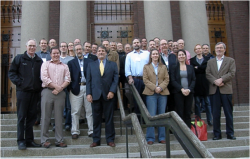The Freshwater Integration Effort (FWI) held a synthesis capstone workshop on 30 September–4 October 2009 in Stockholm, Sweden to tie together key findings and outcomes of the FWI effort and integrate them with other international activities.
The workshop, "Synthesizing International Understanding of Changes in the Arctic Hydrological System," was sponsored by the NSF Arctic System Science Program (ARCSS) through the Arctic-CHAMP Science Management Office at City College of New York / University of New Hampshire, the International Study of Arctic Change (ISAC), and the International Arctic Research Center (IARC; University of Alaska Fairbanks). The IPY Arctic-HYDRA program was also heavily involved in planning efforts.

The workshop aimed to: (1) take stock of recent advances in our understanding of changes in the arctic hydrological system; (2) identify key remaining research gaps; and (3) gather insight on where to focus future national and international research efforts. Participants also discussed strategies for integration of hydrological research into broader system-science initiatives (e.g., ISAC, Second International Conference on Arctic Research Planning [ICARP-II], SEARCH). In addressing the key research gaps, participants identified several key unknown science questions.
The overarching question identified was: Do cumulative effects of changes in the water, energy, and carbon cycles over space and time lead to new equilibrium states?
That question was broken down into several sub-questions:
- What are the abrupt changes in the water, energy, and carbon systems, and where are they likely to be located today and in the future?
- When and over what time scales do abrupt changes occur?
- What is the role of cumulative and synergistic changes in the water, energy, and carbon cycles in controlling arctic system change?
- How can changes in the water, energy, and carbon cycles be used to explain changes in other components of the arctic system such as wildlife and human societal change?
- What roles do the changing water, energy, and carbon cycles play in promoting and forcing adaptations?
- How will abrupt or "step" changes in the arctic system impact and feed back into the global system, and what is the role of water, energy, and carbon?
Workshop Organizing Committee
- Larry Hinzman, International Arctic Research Center/UAF (USA)*
- Maribeth Murray, International Study of Arctic Change (Sweden)*
- Jonathan Pundsack, University of New Hampshire (USA)*
- Charles Vörösmarty, The City College of New York (USA)*
- Julia Boike, Alfred Wegener Institute for Polar and Marine Research (Germany)
- Terry Callaghan, Abisko Scientific Research Station, Royal Swedish Academy of Sciences (Sweden)
- Brent Hasholt, University of Copenhagen (Denmark)
- Terry Prowse, University of Victoria & Environment Canada (Canada)
- Markku Puupponen, Finnish Environmental Institute (SYKE) (Finland)
- Igor Shiklomanov, State Hydrological Institute (SHI) (Russia)
- Árni Snorrason, Icelandic Meterolgical Office (Iceland)
- Jan-Gunnar Winther, Norwegian Polar Institute (Norway)
*Core Organizing Committee
The core workshop Organizing Committee (see sidebar) is spearheading efforts to publish a white paper, which will outline key research and technology successes over the last decade; identify gaps and impediments to progress; and recommend future research, focusing on the nexus of water, energy, and carbon across the Arctic. The Organizing Committee expects to finalize the white paper in late 2010.
The meeting agenda and presentations from this workshop are archived on the ISAC website: http://arcticchange.org/.
For more information about the workshop or FWI activities, please see the FWI website: http://arcticchamp.sr.unh.edu/projects.shtml or contact Jonathan Pundsack (jonathan.pundsack [at] unh.edu).
